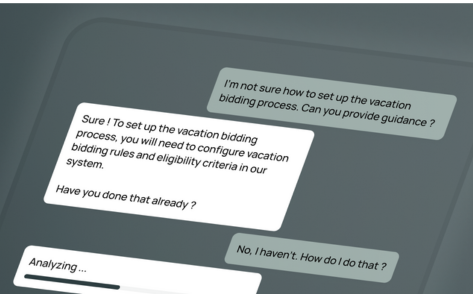The 5 HR Tech Trends of 2024
Curious about the future of HR? Explore the 5 key HR Tech trends of 2024, including Generative AI and Dynamic Ecosystems, for a glimpse into the next era of workforce management.




MONTREAL, January 2024 – In the ever-evolving landscape of HR, technology continues to be a driving force, influencing how organizations approach talent acquisition, management, and retention. As we enter 2024, let's take a glance at five noteworthy trends that give us a sneak peek into a future where technology plays a significant role in streamlining HR processes and improving the overall employee experience. Interested in the latest tech trends shaping HR in 2024? Check out the key trends that the Zaddons team believes you should keep an eye on this year.
1. Generative AI
It's no surprise that AI is at the top of our list. Gen AI, or Generative AI, has become a cornerstone in HR tech, revolutionizing how companies approach various aspects of their operations.
This technology empowers organizations to make informed decisions, from the initial hiring process to optimizing employee schedules. Companies can tap into a wealth of data-driven insights by utilizing Gen AI, resulting in a more efficient and effective workforce. Moreover, this approach aligns with the goal of empowering employees and improving their overall experience.
If you're unfamiliar with Gen AI and why it matters for modern HR solutions, check out our article on the subject. It provides an insightful overview, enabling you to capture the essence and recognize its significance in today’s HR environment.
2. Dynamic HR Tech Ecosystem
The HR Tech Stack has evolved remarkably over the past few years. Companies now view their HR tech infrastructure not as a singular platform but as a dynamic ecosystem of seamlessly embedded tools. This approach balances the need for independent tools in your tech stack with the necessity of seamless integration.
As compliance issues and regulations evolve, an integrated HR Tech Ecosystem becomes indispensable. It assists organizations in staying compliant and agile amidst changing landscapes. This interconnected approach not only simplifies processes but also enhances overall HR efficiency. Think of it as a digital transformation, where tools seamlessly work together, providing better data and intelligence for more informed decision-making.
3. Employee Empowerment Platform
The rise of Employee Satisfaction and Self-Service platforms is undeniable. These platforms provide companies with powerful tools to empower and motivate their employees, resulting in improved satisfaction and higher retention rates. From self-scheduling to benefits management, these platforms now play a crucial role in facilitating career pathing and internal hiring, reflecting a growing trend in the business world.
Recent research indicates that 39% of employers plan to emphasize internal hiring in 2024, recognizing the competitive job market and the importance of prioritizing employee development for retention purposes.
Integrating AI adds an extra layer of personalization, tailoring experiences to individual preferences and fostering positive relationships between employees and management. Ultimately, these platforms are becoming indispensable tools in the ongoing efforts to improve company culture and promote employee happiness.
4. People Analytics
In 2024, people analytics takes center stage with even greater sophistication. Advanced analytics tools, coupled with AI, enable organizations to predict and address potential challenges before they occur. This approach empowers HR professionals to make informed decisions, optimize talent acquisition processes, and cultivate a more productive and engaged workforce. With the integration of predictive analytics, organizations can anticipate trends, identify potential issues, and proactively implement talent development and retention strategies.
Beyond streamlining HR, People Analytics aligns human capital strategies with organizational goals, creating an agile and responsive workforce. However, the importance of a dynamic tech stack cannot be overstated, ensuring real-time and accurate data for effective decision-making.
5. Learning and Development Tech
With an increased emphasis on continuous learning, personalized micro-learning is gaining traction, outshining traditional Learning Management Systems (LMS). This shift reflects a focus on delivering tailored and adaptive learning experiences, acknowledging the unique needs of individual employees. By allowing employees to shape their own learning journey, organizations foster engagement and ensure relevance to individual goals. Notable examples of apps facilitating this shift include platforms like Whatfix and EdApp, which offer personalized, bite-sized courses, allowing users to learn at their own pace. Let’s not forget about the adaptability of micro-learning that aligns seamlessly with the dynamic nature of the modern workplace.
As we step into 2024, the HR tech landscape is marked by innovation and a commitment to enhancing the employee experience. All these trends signal a future where technology becomes an invaluable ally in shaping successful and resilient organizations. By embracing these trends, companies can foster a workplace that not only meets the needs of today but is well-prepared for the challenges of tomorrow.
Subscribe to our Newsletter
Stay ahead of the curve with exclusive updates, valuable insights, and exciting opportunities delivered directly to your inbox
Related articles





